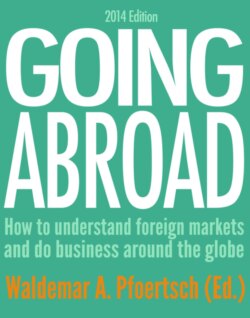Читать книгу Going Abroad 2014 - Waldemar A. Pfoertsch - Страница 23
На сайте Литреса книга снята с продажи.
Оглавление4 Getting prepared for the first visit
It is highly recommended to visit prospective business partners in order to make personal contacts and build trust. Like in domestic business, face-to-face meetings with partners are the best form of business contact. By traveling abroad, you can also examine the markets where you are considering selling your products, and your company can familiarize itself with the foreign culture. This might impact the design and advertising of a product. Moreover, additional new partners can be located and communication with existing business partners can be improved.
It is not uncommon for this initial trip to result in no finalized business and little chance of closing sales in the future. However, the expenses incurred for such a trip are well worth the money since further steps cannot be taken without this initial trip.
4.1 Learn about the laws and regulations
As in every country, the government influences foreign business by its own laws and regulations. It is crucial to be knowledgeable of the limitations in a country before visiting. For instance, in a centralized economy, direct contacts to companies are difficult, as the decision making is centralized. Initial contact is made via intermediaries (foreign trade organizations or foreign trade corporations) who evaluate the commercial aspects of a potential import like price, payment terms, quality, etc. Before contacting a company it is very important to find out how much authority it has.
A business trip can be turned into a major success for your company if it is well prepared. For example, general knowledge of the country and business practices researched ahead of time will not only facilitate the visit, but a good impression of your company will be left behind. Research material is available for every country (e.g. at embassies or in the Internet), so there is no excuse for entering international business unprepared. In general, flexibility and cultural sensitivity should be the guiding principles for traveling abroad on business. More detailed information for various countries on social etiquette and business practices will be covered later in this book.
4.2 Prior scheduling
Appointments need to be scheduled before traveling to the country. It is not advisable to try to get an appointment after you have already arrived in the country. Even if the right people are available, which is unlikely, they prefer appointments. Once you have sent your introduction letter, you can ask for an appointment in another letter. Try to follow up this letter and get in touch with a secretary to remind her of the letter and to ask for an appointment.
4.3 Meeting the right person
When asking for an appointment, you have to know whom you would like to meet. Too often, a visit is wasted because the counterpart does not have enough responsibility to make decisions. In general, compare the contact company with your own one. Get to know the hierarchy of the company and choose the highest manager possible. However, beware that there is a problem with going too high. The problem of going too high is that the highest managers have the power to make an early rejection, which cannot be changed later.
Many countries are very status-conscious even for first appointments, which means that all participants of a meeting should have the same status. It would be an offense to send someone beneath the counterpart’s position, as that would mean that the meeting is not very important.
In some countries, especially in Asia, an intermediary may be necessary for a successful contact. One possibility is to hire a contact from your industry to introduce you. The contact adds credibility and security to the first meeting and the right contact may even be all that you need for a positive outcome.
